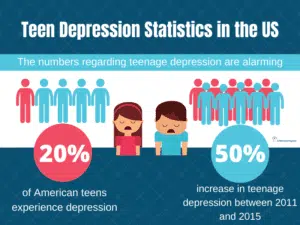Teen Depression: A Look at a Chronic Problem Among Our Youth
How many times have you heard (or perhaps even said yourself) that teenagers are just moody people? These half-grown adults are finding their own ways and outlooks, they’re dealing with more social pressure than most, and their minds and bodies are changing so rapidly that it can be hard to keep up. They can go from being overly ecstatic to being overly dramatic in the blink of an eye.
Emotional rollercoastering is kind of common for teens, but some teens hit major lows and they stay in that dark place. In spite of the fact that millions of adults struggle with clinical depression, the majority of depressed children and adolescents are dismissed and never diagnosed. Unfortunately, teenage depression is very real, and when left untreated, a teen can be at serious risk.
Teen Depression in the U.S. Is at an Alarming High

The numbers regarding depression and American teens are alarming. Studies have shown that roughly 20 percent of young people experience depression before they reach the age of adults. Less than a third of teens with depression will ever be treated for the condition.
Even more alarming, suicide (which is closely linked to depression) is the third most common cause of death among young people between the ages of 15 and 24. The rates of teen depression have been on a scary incline for the last decade. Between 2011 and 2015 alone, there was a 50 percent increase in teens that portrayed signs of clinical depression.
The Link Between Teen Depression and Your Child Being an At-Risk Youth
At-risk youth are children who may not make it into adulthood safe and sound without some kind of intervention. “At-risk” can refer to the risk of a child not succeeding at school, not being prepared for a job, or not becoming a functional member of society. However, the phrase is also used to describe a teen that is at imminent risk of doing damage to themselves or others, whether that is through physical or emotional harm.
A teen that seems to be acting out or is causing a lot of problems and worry is most often suffering behind the visage they are showing the people around them. Depression, especially when undiagnosed and untreated, could easily lead to a teen making poor life decisions, taking dangerous risks, and doing things that can completely alter their life course.
Not only is depression a risk factor for a teen being at risk, but it can also signify other problems, such as:
- Another undiagnosed medical or mental health condition like ADHD (Attention Deficit Hyperactivity Disorder), vitamin deficiency, or hypothyroidism
- Prior trauma or abuse that caregivers either don’t know about or have not sought therapy for (sexual abuse, bullying, witnessing a traumatic event)
- A substance abuse problem
Even though teenage problems are easily dismissed as a child just being a typical teen, it is critical to take a closer look to determine if the teen is truly at-risk and could be suffering from depression or other issues.
Warning Signs of Teen Depression
Depressed teens do not always portray the same warning signs and symptoms as adults with clinical depression. Some research has suggested that teens with depression are more likely to be irritable or angry, and some may deal with more physical symptoms due to the inability to completely express their emotions. Some typical signs of teen depression according to the Anxiety and Depression Association of America include:
- Changes in sleep patterns (sleeping a lot more than usual or not sleeping as much)
- Lack of interest in activities that were once considered enjoyable
- Withdrawal from social interactions with friends and family
- Changes in weight or appetite (increased appetite is more common in depressed teens)
- Making comments about being hopeless, no good, or showing an attitude of lacking self-worth
- Inability to concentrate or changes in academics
- Excessive agitation or angry outbursts
- Running away from home or making plans to run away from home
- Romanticizing death or dying, writing letters or messages to people to say goodbye, giving away items of value
As already noted, not all teens with depression will portray the same symptoms, so your teen may only show a few indicators. In order for clinical depression to be diagnosable in a teen, some symptoms must be present for at least 14 days and should be noticeable on most days within that time frame.
How to Help a Depressed Teen as a Parent or Caregiver
Your first line of defense to help a teen with depression is to recognize the problem. If your teen is having behavioral issues or is showing any of the signs and symptoms that something is wrong, make sure you talk openly with your teen about what they are going through. Educate yourself about teen depression beforehand, make sure you can be open and non-judgemental about the teen’s emotions, and ask questions. Be careful not to blame or argue during the conversation and never minimize what they are feeling.
If you believe your teen does have depression, seek the advice of a mental health professional to obtain a proper diagnosis. Consider seeking out a youth specialist who can offer talk therapy for depressed teens as well. Sometimes, something like at risk youth schools that offer therapeutic programs for adolescent depression can also be a necessary intervention. If you believe your child is suicidal or severely at risk, it is critical to take action and take precautions to protect them.
Consider Schools or Treatment Centers for At-Risk Youth
Even though residential treatment centers or at-risk youth schools are often considered as a last resort for at-risk youth, these programs can be a saving grace and are worth consideration early on. These programs for at-risk youth can have a profound effect on the child and help to ensure they get the therapeutic attention needed to get back on the right track. If you would like to know more about therapeutic placements, reach out to us at At Risk Youth Programs to speak with a counselor who can help.















